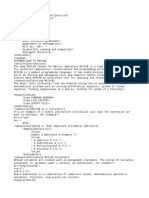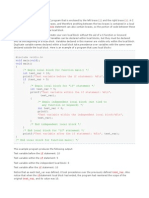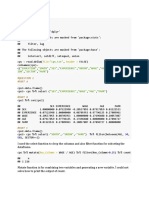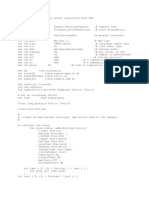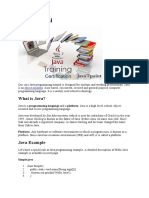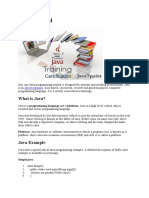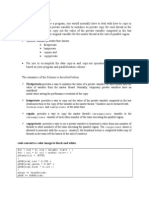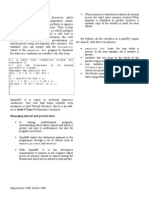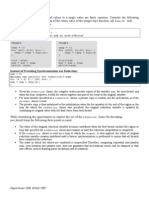Example:: Static Runtime Dynamic Guided
Example:: Static Runtime Dynamic Guided
Uploaded by
bsgindia82Original Description:
Original Title
Copyright
Available Formats
Share this document
Did you find this document useful?
Is this content inappropriate?
Report this DocumentCopyright:
Available Formats
Example:: Static Runtime Dynamic Guided
Example:: Static Runtime Dynamic Guided
Uploaded by
bsgindia82Copyright:
Available Formats
Example:
#pragma omp parallel for for ( k = 0; k < 100; k++ ) { x = array[k]; array[k] = do_work(x); }
This problem can be fixed in either of the following two ways, which both declare the variable x as private memory.
// T !" work"# T e $ar!a%le x !" "pe&!f!ed a" pr!$a'e# #pragma omp parallel for pr!$a'e(x) for ( k = 0; k < 100; k++ ) { x = array[!]; array[k] = do_work(x); } // T !" al"o work"# The variable x is now private. #pragma omp parallel for for ( k = 0; k < 100; k++ ) { !(' x; // $ar!a%le" de&lared w!' !( a parallel // &o("'r)&' are* %y def!(!'!o(* pr!$a'e x = array[k]; array[k] = do_work(x); }
Loop scheduling and Partitioning: To have good load balancing and thereby achieve optimal performancein a multithreaded application, you must have effective loop schedulingand partitioning. The ultimate goal is to ensure that the execution cores are busy most, if not all, of the time, with minimum overhead of scheduling, context switching and synchronization. OPENMP offers !cheduling schemes:
Static Runtime Dynamic Guided
Department CSE, SCAD CET
Effective use of "eduction:
Department CSE, SCAD CET
You might also like
- The A-Mazing RaceDocument16 pagesThe A-Mazing Raceapi-489665585Noch keine Bewertungen
- Perl WorkshopDocument68 pagesPerl WorkshopVenkat Kiran Sribhashyam100% (1)
- Perl Cheat SheetDocument2 pagesPerl Cheat Sheetdinokid08100% (1)
- Cayley Hamilton 2011Document10 pagesCayley Hamilton 2011rammar147Noch keine Bewertungen
- Examples of L TEXDocument29 pagesExamples of L TEXJohnnyNoch keine Bewertungen
- Protecting Updates of Shared VariablesDocument2 pagesProtecting Updates of Shared Variablesbsgindia82Noch keine Bewertungen
- AuthorDocument8 pagesAuthorlogankr35ggg1Noch keine Bewertungen
- What Are Scripting Languages?: Designed To Support "Quick Programming"Document7 pagesWhat Are Scripting Languages?: Designed To Support "Quick Programming"Lucas TorquatoNoch keine Bewertungen
- Algoritimo de GruntzDocument11 pagesAlgoritimo de GruntzLucas Gabriel CasagrandeNoch keine Bewertungen
- Aks CodesDocument53 pagesAks CodesMargit OrsósNoch keine Bewertungen
- I.S.F.D y T. #103: Profesorado de Técnicos Prof: Martín MellerDocument11 pagesI.S.F.D y T. #103: Profesorado de Técnicos Prof: Martín MellerAriel LeucipoNoch keine Bewertungen
- Lecture 20-2 Perl Programming: /usr/local/bin/perl /usr/bin/perlDocument10 pagesLecture 20-2 Perl Programming: /usr/local/bin/perl /usr/bin/perlsavio77Noch keine Bewertungen
- Shell Scripting: Presented by - Mukesh Halwan Premkanth MenganiDocument25 pagesShell Scripting: Presented by - Mukesh Halwan Premkanth Menganisrinivas godavarthyNoch keine Bewertungen
- ASCIIMath MLDocument61 pagesASCIIMath MLchau114Noch keine Bewertungen
- How To Do Math and TcsDocument65 pagesHow To Do Math and TcsArshidNoch keine Bewertungen
- Documentclass (10pt, A4paper) (Article)Document5 pagesDocumentclass (10pt, A4paper) (Article)dikshita401kNoch keine Bewertungen
- Week 3 PDFDocument32 pagesWeek 3 PDFTanapat LapanunNoch keine Bewertungen
- Awk: More Complex ExamplesDocument16 pagesAwk: More Complex ExamplesArun SauNoch keine Bewertungen
- PerlDocument62 pagesPerlvivek_121079Noch keine Bewertungen
- Searching With PHP and Mysql: by Cal HendersonDocument8 pagesSearching With PHP and Mysql: by Cal HendersonRiyan PrisdiantoNoch keine Bewertungen
- PHP Function & ArraysDocument24 pagesPHP Function & Arraysyuki tetsuNoch keine Bewertungen
- 10 Minute (WX) Maxima Tutorial - WXM 1 / 5Document5 pages10 Minute (WX) Maxima Tutorial - WXM 1 / 5Katta BajNoch keine Bewertungen
- Codigo Agar - IoDocument9 pagesCodigo Agar - IoAnderNoch keine Bewertungen
- String in JavaScriptDocument92 pagesString in JavaScriptclouditlab9Noch keine Bewertungen
- Chapter 7: Hashes: By: Kushal JangidDocument28 pagesChapter 7: Hashes: By: Kushal JangidKing_JangidNoch keine Bewertungen
- Clo JureDocument57 pagesClo JureDerricksitaPompitazVasquezNoch keine Bewertungen
- Basics: Basics Arrays and Dictionaries Control Flow Functions Closures Classes Enums Other LinksDocument1 pageBasics: Basics Arrays and Dictionaries Control Flow Functions Closures Classes Enums Other LinksigipuNoch keine Bewertungen
- SmartyDocument6 pagesSmartysiyerinduNoch keine Bewertungen
- Short Perl Tutorial: Instructor: Rada Mihalcea University of AntwerpDocument34 pagesShort Perl Tutorial: Instructor: Rada Mihalcea University of AntwerpBhaskar BabuNoch keine Bewertungen
- I QC ProgrammingDocument10 pagesI QC ProgrammingrosctNoch keine Bewertungen
- Perl For Bio in For Ma TicsDocument158 pagesPerl For Bio in For Ma TicsAmitha SampathNoch keine Bewertungen
- Programming With Awk and PerlDocument4 pagesProgramming With Awk and PerlUjjwal PradhanNoch keine Bewertungen
- "Cps - TXT" "Education" "South" "SEX" "Experience" "Union" "WAGE" "AGE" "RACE" "Occupat Ion" "Sector" "MARR"Document9 pages"Cps - TXT" "Education" "South" "SEX" "Experience" "Union" "WAGE" "AGE" "RACE" "Occupat Ion" "Sector" "MARR"Alper Tamay ArslanNoch keine Bewertungen
- Week 03 Lec 01 ArraysDocument68 pagesWeek 03 Lec 01 ArraysAftab JamaliNoch keine Bewertungen
- ARIMAsDocument75 pagesARIMAsdanifdezclashNoch keine Bewertungen
- Desct 1Document46 pagesDesct 1Guilherme HenriqueNoch keine Bewertungen
- PHP LectureDocument45 pagesPHP LecturemysthicriousNoch keine Bewertungen
- AWK HartiganDocument4 pagesAWK HartiganFerFaustusNoch keine Bewertungen
- Deadlock Free CodeDocument2 pagesDeadlock Free Codebsgindia82Noch keine Bewertungen
- Freebitco - in V 4.5.2Document10 pagesFreebitco - in V 4.5.2john suwandiNoch keine Bewertungen
- Limits of FunctionsDocument7 pagesLimits of Functionsbub12345678Noch keine Bewertungen
- Chapter 1Document5 pagesChapter 1Sida WangNoch keine Bewertungen
- Animation of Taylor Maclaurin Series Converging To TheiflagDocument19 pagesAnimation of Taylor Maclaurin Series Converging To TheiflagMarkus StarkNoch keine Bewertungen
- (Developer Shed Network) Server Side - PHP - String TheoryDocument23 pages(Developer Shed Network) Server Side - PHP - String TheorySeher KurtayNoch keine Bewertungen
- CodeDocument8 pagesCodenikhil18salviNoch keine Bewertungen
- Introduction To PerlDocument62 pagesIntroduction To PerlParimal Dave100% (1)
- PERL Programming BasicDocument106 pagesPERL Programming BasicJohn100% (3)
- Perl Programming: Presented by Mark Bixby Solution Symposium 2001Document39 pagesPerl Programming: Presented by Mark Bixby Solution Symposium 2001ahona26100% (1)
- Short Perl Tutorial: Instructor: Rada Mihalcea University of AntwerpDocument34 pagesShort Perl Tutorial: Instructor: Rada Mihalcea University of AntwerpAshoka VanjareNoch keine Bewertungen
- Swift Cheat Sheet PDFDocument21 pagesSwift Cheat Sheet PDFKreason Aaron NaidooNoch keine Bewertungen
- 2013-12-02 Product Rule, Why You Should Believe ItDocument6 pages2013-12-02 Product Rule, Why You Should Believe ItsamjshahNoch keine Bewertungen
- Python Heralding Sep2019Document870 pagesPython Heralding Sep2019strecozza100% (2)
- TFCHK DdedDocument6 pagesTFCHK DdedEdwin Nosrehy QuispeNoch keine Bewertungen
- LuanvanDocument17 pagesLuanvanNhư Ý Nguyễn ThịNoch keine Bewertungen
- MC GuffinDocument51 pagesMC Guffinvaibhav guptaNoch keine Bewertungen
- Institute of Informaiton Technology Jahangirnagar University Experiment 1 & 2: Introduction To MATLABDocument9 pagesInstitute of Informaiton Technology Jahangirnagar University Experiment 1 & 2: Introduction To MATLABMahfidNoch keine Bewertungen
- Amsmath PDFDocument96 pagesAmsmath PDFPark IlyNoch keine Bewertungen
- Java Platforms / Editions: 3) Enterprise ApplicationDocument11 pagesJava Platforms / Editions: 3) Enterprise Applicationbsgindia82Noch keine Bewertungen
- Java TutorialDocument23 pagesJava Tutorialbsgindia82Noch keine Bewertungen
- Java Example: Platform: Any Hardware or Software Environment in Which A Program Runs, Is Known As ADocument12 pagesJava Example: Platform: Any Hardware or Software Environment in Which A Program Runs, Is Known As Absgindia82Noch keine Bewertungen
- The Tungabhadra RiverDocument4 pagesThe Tungabhadra Riverbsgindia82Noch keine Bewertungen
- Knowledge-Based SystemsDocument1 pageKnowledge-Based Systemsbsgindia82Noch keine Bewertungen
- Java TutorialDocument13 pagesJava Tutorialbsgindia82Noch keine Bewertungen
- Java TutorialDocument13 pagesJava Tutorialbsgindia82Noch keine Bewertungen
- Mung Chiang Sangtae Ha: Surve Yon Fog Comp UtingDocument2 pagesMung Chiang Sangtae Ha: Surve Yon Fog Comp Utingbsgindia82Noch keine Bewertungen
- 5.explain How Non-Blocking Algorithm Used To Resolve The Deadlock Issues? With Example?Document3 pages5.explain How Non-Blocking Algorithm Used To Resolve The Deadlock Issues? With Example?bsgindia82Noch keine Bewertungen
- Mung Chiang Sangtae Ha: System Modelling & Advancement in Research Trends (SMART), International ConferenceDocument6 pagesMung Chiang Sangtae Ha: System Modelling & Advancement in Research Trends (SMART), International Conferencebsgindia82Noch keine Bewertungen
- Database: Rdbms MongodbDocument7 pagesDatabase: Rdbms Mongodbbsgindia82Noch keine Bewertungen
- Data GridDocument7 pagesData Gridbsgindia82Noch keine Bewertungen
- Differences DBMS RDBMSDocument4 pagesDifferences DBMS RDBMSbsgindia82Noch keine Bewertungen
- Data Copy in Copy OutDocument2 pagesData Copy in Copy Outbsgindia82Noch keine Bewertungen
- Department CSE, SCAD CETDocument2 pagesDepartment CSE, SCAD CETbsgindia82Noch keine Bewertungen
- Schedule (Dynamic) Schedule (Dynamic) Schedule (Dynamic, 16) : Parallel Pragma Suspend or Resume of ThreadDocument1 pageSchedule (Dynamic) Schedule (Dynamic) Schedule (Dynamic, 16) : Parallel Pragma Suspend or Resume of Threadbsgindia82Noch keine Bewertungen
- Cache Line Ping-Ponging:: Department CSE, SCAD CETDocument2 pagesCache Line Ping-Ponging:: Department CSE, SCAD CETbsgindia82Noch keine Bewertungen
- Deadlock Free CodeDocument2 pagesDeadlock Free Codebsgindia82Noch keine Bewertungen
- Copyin: Department CSE, SCAD CETDocument2 pagesCopyin: Department CSE, SCAD CETbsgindia82Noch keine Bewertungen
- Interleaving Single & Multiple Thread For Execution:: Department CSE, SCAD CETDocument1 pageInterleaving Single & Multiple Thread For Execution:: Department CSE, SCAD CETbsgindia82Noch keine Bewertungen
- Data Race Conditions:: Department CSE, SCAD CETDocument1 pageData Race Conditions:: Department CSE, SCAD CETbsgindia82Noch keine Bewertungen
- X X X - Old X - New Op (X - Old) Interlockedcompareexchange X X - OldDocument2 pagesX X X - Old X - New Op (X - Old) Interlockedcompareexchange X X - Oldbsgindia82Noch keine Bewertungen
- Effective Use of Reduction:: Department CSE, SCAD CETDocument1 pageEffective Use of Reduction:: Department CSE, SCAD CETbsgindia82Noch keine Bewertungen
- Memory Reclamation Problem:: I. Bandwidth Ii. Working in The Cache Iii. Memory ContentionDocument1 pageMemory Reclamation Problem:: I. Bandwidth Ii. Working in The Cache Iii. Memory Contentionbsgindia82Noch keine Bewertungen
- Work-Sharing Sections:: Department CSE, SCAD CETDocument2 pagesWork-Sharing Sections:: Department CSE, SCAD CETbsgindia82Noch keine Bewertungen
- Factors Affecting Performance of ProgramDocument2 pagesFactors Affecting Performance of Programbsgindia82Noch keine Bewertungen
- Cache Line Ping PongDocument1 pageCache Line Ping Pongbsgindia82Noch keine Bewertungen
- Memory ConsistyencyDocument1 pageMemory Consistyencybsgindia82Noch keine Bewertungen















